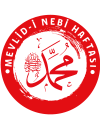INTERNATIONAL MAWLID AL-NABI SYMPOSIUM
"OUR PROPHET AND SOCIETY OF FAITHFULNESS"
(29-31 October 2021)
Faithfulness is to establish a relationship with the family, relatives, close acquaintances, friends and all the created, especially our great Lord (swt), on the basis of trust and loyalty. Faithfulness is to stay loyal to one’s word and to exert one’s self in order to conserve it. It is to show ultimate attention so as to the word and the essence are correct and in harmony with each other. Faithfulness is the brother of truth, righteousness and justice. The opposite of faithfulness, ghadr (treachery), is the brother of lie, deception and oppression.
Faithfulness is an asset and value for the individual, and peace and happiness for the society. It is one of the most essential values and the most divine traits for the social body. Because all conducts, agreements and social relations do depend on faithfulness. If treachery arises in a society, the sense of trust is shaken. If there is no appreciation and faithfulness in the individual and social life, the humanly relations are damaged, the spirit of social solidarity and helping is lost, and accordingly, the social peace is destroyed.
Faithfulness and appreciation are of iman, and treachery is the sign of dissention. For this reason, the believer is faithful and he must be faithful. Faithfulness is required by the morals of a believer. For a believer, with no doubt, the greatest one of the types of faithfulness is the one for his great Lord (swt) who created him as the honorable one among the created. The greatest faithfulness is a person knowing his Lord, believing Him, and fulfilling his duty of being a servant to Him, and the biggest ungratefulness is a person denying his Lord, not accepting His supremacy and abstaining from being a servant to Him. We should never forget that the man promised to the Almighty Allah (swt) in “Bazm-i Alast” that he shall believe Him and be His servant. Therefore, the true faithfulness in the presence of the Almighty Allah (swt) is to never forget the promise given to Him and to be loyal to this covenant and pact at any cost and under any circumstances. The man who equips himself with faithfulness for his Lord shall be appreciative to the servants of His as well. He shall be aware of the fact that any kind of treachery of his to his parents, spouse and children, relatives and friends and the earth that he came for the trial shall violate the sense of faithfulness that he hosts for his Lord.
Today, unfortunately, the moral values are severely injured and simply pushed across the edges of the life. In these modern times when an erosion of moral values has been experienced and the values are being corrupted, the sense of faithfulness has its share on the matter. As a matter of fact, treachery runs rampant on the today’s world and man. Especially this treachery reveals itself regarding the duty of being a servant to the great Lord (swt) being neglected. The more treachery to the great Lord (swt) increases, the more incidents of parents, spouses and children left to solitude increases, and we witness this in a daily basis with sorrow. With numerous promises and oaths not kept by ignoring the fact that word gives a responsibility to man, the sense of faithfulness to covenant is weaken. Today, there is the need of remembering our covenant with our great Lord (swt) and renewing or pact of faithfulness with all the humanity and the universe. We, the believers, are responsible and obliged to reestablish the society of faithfulness in the guidance of our beloved Prophet Muhammad (saw) who lived and represented the faithfulness at the ultimate level and who is the man and teacher of faithfulness.
Objective of the Symposium
It is to contribute to establish a social awareness and consciousness by bringing the subject of faithfulness, which is about to be forgotten in this global age that we live in and one of the most supreme virtues, into the agenda of our people. It is to address to the concept of faithfulness through the frame of Qur’an and Sunnah pursuant to different scientific disciplines, to make strong impressions especially with examples from the life of Prophet of faithfulness (saw), and to set forth the fundamental dynamics of the society of faithfulness. It is to evaluate the beautiful practices and experiences performed during the historical process of constructing the society of faithfulness through the perspective of today and to strive to create a base for reconstruction of the society of faithfulness.
-
Etymological and Semantic Analysis of the Concept of Faithfulness
-
Faithfulness as a Psychological Phenomenon
-
Sociological Dimensions and Basics of the Concept of Faithfulness
-
Understanding of Faithfulness in Semitic Religions
-
Concept of Faithfulness in the Society and Poetry of the Age of Ignorance
-
Fact of Faithfulness on the Perspective of Religious and Values Education
-
The Qur'anic Basis of the Concept of Faithfulness
-
Faithfulness in the Tradition of the Prophets in the Context of Qur'anic Anecdotes
-
Faithfulness in the Meaning of Hadiths: Faithfulness from the Prophet Muhammad's (saw) Words
-
The Fundamental Principles of Qur’an and Hadith in the Construction of Faithfulness
-
The Concepts Related to Faithfulness in Qur’an and Hadiths
-
The Concept of “Bazm-i Alast” in Qur’an and Faithfulness of the Servant to Allah (swt)
-
Prophet Muhammad (saw) as a Faithful Human Model
-
The References of the Society of Faithfulness in Sunnah
-
The Construction Process of the Society of Faithfulness of Prophet Muhammad (saw): The Example of Companions
-
A Look at the Family Life of Prophet Muhammad (saw) through the Concept of Faithfulness
-
Analysis on the Relations of the Prophet of Faithfulness (saw) with the Believers of Other Religions
-
The Messages Given to Today by the Relationship of Faithfulness of Prophet Muhammad (saw) with All Living and Non-Living Beings
-
The Faithfulness of the Companions to Prophet Muhammad (saw) and Each Other
-
The Concept of Faithfulness in the Islamic Ethical Thinking and Philosophy
-
Faithfulness in Islamic Law
-
Faithfulness in Sufi Thinking Tradition
-
Faithfulness as an Ethical Value in the Islamic Culture and Literature
-
Faithfulness to Knowledge in the Tradition of Islam: The Codification and Classification of the Sciences and the Master-Disciple Relationship
-
Faithfulness to Prophet Muhammad (saw) in Islamic Literature and Arts
-
The Examples of Faithfulness to Prophet Muhammad (saw) in the Seljuk and Ottoman Societies
-
Faithfulness to Prophet Muhammad (saw) in Islamic Geography Throughout the History
-
The Practices for Construction and Consolidation of the Society of Faithfulness in Islamic Thinking
-
Reading the Culture of Charity over Faithfulness
-
Modern Individual, Modern Society and the Failure of Faithfulness
-
The Effect of Modernization to Religious Life and the Language of Faithfulness in Global Age
-
The Possibility of Construction of the Society of Faithfulness in Modern Age
-
The Obstacles Before the Construction of the Society of Faithfulness in This Age and Solution Proposals Thereof
-
The Image of Man of the Modernity: Is It an Obstacle or Opportunity for the Construction of the Society of Faithfulness?f
-
A Relative Analysis of the Faithfulness Fact between the Tradition and Modernism
-
A Solution Proposal for the Ecological Problems: An Evaluation over the Concepts of the Entrusted and Faithfulness
-
Faithfulness and Treachery in the Digital Age
-
To Understand the “Other” as the Opportunity for the Society of Faithfulness Today and To Develop Relationships on the Basis of Faithfulness
-
The Sense/Fact of Faithfulness in Domestic Relationships Today
-
The Relations of Relatives and Neighbors and Faithfulness in Modern Times
-
Faithfulness in the Economical Life and Professional Life
-
The Groups Who Have the Biggest Need for Faithfulness in Social Life
-
Surveys Regarding the “VEFA (Faithfulness) Social Support Groups” in the Process of Pandemic
Honorary President of the Symposium
Prof. Dr. Ali ERBAŞ, President of Religious Affairs
Scientific Committee of the Symposium
Prof. Dr. Abdurrahman HAÇKALI, Presidency of Religious Affairs, Turkey
Prof. Dr. Huriye MARTI, Presidency of Religious Affairs, Turkey
Prof. Dr. İbrahim Hilmi KARSLI, Presidency of Religious Affairs, Turkey
Assoc. Prof. Dr. Selim ARGUN, Presidency of Religious Affairs, Turkey
Dr. Mustafa Bülent DADAŞ, Presidency of Religious Affairs, Turkey
Prof. Dr. Abdullah KAHRAMAN, Presidency of Religious Affairs, Turkey
Prof. Dr. Ali AVCU, Presidency of Religious Affairs, Turkey
Prof. Dr. Enbiya YILDIRIM, Presidency of Religious Affairs, Turkey
Prof. Dr. Hacı Mehmet GÜNAY, Presidency of Religious Affairs, Turkey
Prof. Dr. Halis AYDEMİR, Presidency of Religious Affairs, Turkey
Prof. Dr. İhsan ÇAPCIOĞLU, Presidency of Religious Affairs, Turkey
Prof. Dr. Metin ÖZDEMİR, Presidency of Religious Affairs, Turkey
Prof. Dr. Ömer KARA, Presidency of Religious Affairs, Turkey
Prof. Dr. Soner GÜNDÜZÖZ, Presidency of Religious Affairs, Turkey
Assoc. Prof. Dr. Fatih KURT, Presidency of Religious Affairs, Turkey
Dr. Aqil ŞİRİNOV, Azerbaijan Institute of Theology, Azerbaijan
Prof. Dr. Ahmet YAMAN, Necmeddin Erbakan University, Turkey
Prof. Dr. Ali Osman KURT, Ankara Social Sciences University, Turkey
Prof. Dr. Eyup BAŞ, Ankara University, Turkey
Prof. Dr. Fahimah ULFAT, Eberhard Karls University of Tübingen, Germany
Prof. Dr. Hasan Kâmil YILMAZ, İstanbul Sabahattin Zaim University, Turkey
Prof. Dr. Mehmet Emin AY, Uludağ University, Turkey
Prof. Dr. Merdan GÜNEŞ, Osnabrück University, Germany
Prof. Dr. Muhammet Şevki AYDIN, Erciyes University, Turkey
Prof. Dr. Mustafa AĞIRMAN, Atatürk University, Turkey
Prof. Dr. Mustafa SİNANOĞLU, İstanbul 29 Mayıs University, Turkey
Prof. Dr. Raşit KÜÇÜK, Turkiye Diyanet Foundation (TDV) Centre for Islamic Studies (ISAM), Turkey
Prof. Dr. Saffet KÖSE, İzmir Kâtip Çelebi University, Turkey
Assoc. Prof. Dr. Sultanmurat ABJALOV, Ahmet Yesevi University, Kazakhstan
Prof. Dr. Tarek BADAWİA, Friedrich-Alexander University of Erlangen-Nürnberg, Germany
Prof. Dr. Yaşar SARIKAYA, Justus-Liebig University of Giessen, Germany
Assoc. Prof. Dr. Zaylabidin ACİMAMATOV, Osh University, Kyrgyzstan
Organization Committee of the Symposium
Dr. Burhan İŞLİYEN
Bünyamin ALBAYRAK
Zekeriya ABDULAZİZOĞLU
Cemalettin NAZLIOĞLU
Fatih AKKOCA
Musa SAYGILI
Symposium Calendar
Symposium Dates : 29-31 October 2021
Due Date for Abstract Submission : 20 Ağustos 2021
Announcement of Accepted Abstracts : 10 September 2021
Due Date for Papers : 22 October 2021
Announcement of Symposium Program : 27 October 2021
Printing of Symposium Texts : 2022-2023
The Language of the Symposium
It is Turkish, Arabic and English.Venue
The Symposium will be held online.Conditions of Participation
- Paper abstracts should be in Turkish, Arabic or English.
- Abstracts should summarize the subject of the paper with outlines and be on the range of 300 - 400 words.
- Abstracts should be submitted via e-mail to mevlidinebihaftasi@diyanet.gov.tr by using accession form.
- The papers should be scientific, authentic and on the range of 5000-7000 words.
Konaklama ve Ulaşım
- Sempozyum çevrim içi olarak gerçekleştirilecektir.
Attendance Request Form
Application form (Türkçe) Application form (العربية) Application form (English) Application form (Deutsch)
Invitation
We are honored to host esteemed scholars and researchers in the International Mawlid al-Nabi Symposium to be organized with theme “Our Prophet and Society of Faithfulness”.
Announcements
Symposium Program
Click here to access the Symposium Program
Contact Information
Presidency of Religious Affairs
General Directorate of Religious Services
Üniversiteler Mahallesi Dumlupınar Bulvarı No:147/A 06800 Çankaya/ANKARA
Telephone : 0312 295 73 59 - 0312 295 73 39
Fax : 0312 284 55 25
E-mail : mevlidinebihaftasi@diyanet.gov.tr
Web Site : http://mevlidinebi.diyanet.gov.tr

